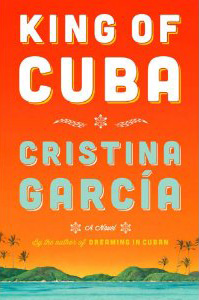
Told with wry wit and keen insight, this entertaining and richly satisfying story about a fictionalized Fidel Castro and an octogenarian Cuban exile obsessed with seeking revenge against the dictator—from the National Book Award finalist and author of Dreaming in Cuban.
El Comandante, an aging Castro-like dictator shambles about his mansion in Havana, visits a dying friend, tortures hunger strikers in one of his prisons, and grapples with the stale end of his life that is as devoid of grandeur as his nearly sixty-year-old revolution. Across the waters in Florida, Goyo Herrera, a Miami exile in his eighties, plots revenge against his longtime enemy—the very same El Comandante—whom he blames for stealing his beloved, ruining his homeland, and taking his father’s life.
Shifting between the two men with great resonance and humor, and peppered with the rabble of other Cuban voices that create a patchwork of history’s unofficial stories, García’s novel plumbs the passions and realities of these two Cubas—on the island, and off. Writing at the top of her form, García returns to the territory of her homeland and her bestselling novel Dreaming in Cuban.
Reviews
“There’s more than one way to face one’s final years: with a sense of grace and peace, or with buoyant denial, an active sex life, and plenty of fight, like the two combative octogenarians in Cristina García’s darkly hilarious new novel, King of Cuba (Scribner). In Cuba, a ruthless dictator, El Comandante (a thinly veiled Fidel Castro), maintains an ineffectual grip on power while pretending that neither his crumbling nation nor his rapidly deteriorating health are headed for disaster. Meanwhile, in steamy Miami, irascible exile Goyo Herrera finds that conspiratorial plots and insurrectionary Internet chat rooms are the cure for what ails; he’s hell-bent on staying alive long enough to see the dictator to his grave. But even as Goyo seeks both to join forces with more youthful rebels and to star in his own action film, he grieves for his recently deceased wife and tries to help his two struggling adult children.
García braids these parallel stories with consummate ease, demonstrating that the common ground between the vainglorious tyrant and the would-be assassin is not so narrow: Both are coming to terms with loves lost, people wronged, the unfamiliarity of a body in failing health, and the legacies they’ll soon enough be leaving behind. With a fine balance of wry absurdity and existential poignancy, García builds not just a tale of the end of days but a snapshot of the past impact and future reverberations of Cuba’s revolution—a theme more fascinating than ever as the once-isolated island nation opens itself to the world. What we stick around for, though, is the suspense that mounts through the novel: What will get El Comandante first—old age, or old Goyo?”
— Elle Magazine
“A clever, well-conceived dual portrait that shows what connects and divides Cubans inside and outside of the island.”
— Kirkus Reviews
“García’s tremendous empathy for her characters is the magnetic force of her fiction, and her lifeblood theme is the scarring legacy of oppression and brutality, particularly the horrors and absurdities of the Castro regime. In her most honed and lashing novel to date, she goes directly to the source…An ingeniously plotted, boisterous, and brilliantly castigating tale” —Booklist (starred review)
“García’s writing is laced with candor and wit as she portrays the lives of two men united by the past.”
— Publishers Weekly
“The portrait García paints of [El Comandante] — nostalgic but utterly unsentimental, evil but magnetic — is the best thing she’s ever written, a pitch-perfect study of tyranny in winter.”
— Steve Donoghue, The Washington Post